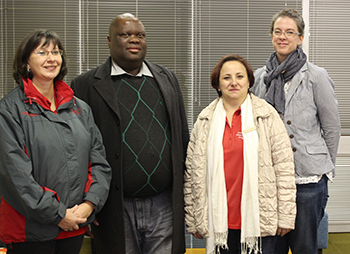Latest News Archive
Please select Category, Year, and then Month to display items
12 October 2020
|
Story Arina Engelbrecht
|
Photo Supplied
 Arina Engelbrecht from Organisational Development and Employee Well-being believes physical activity has a number of benefits for one’s health, including stress relief.
Arina Engelbrecht from Organisational Development and Employee Well-being believes physical activity has a number of benefits for one’s health, including stress relief.
Being physically active plays a big role in preventing the development of mental-health problems and in improving the quality of life of people experiencing mental-health problems.
Treatment for depression
Physical activity can be an alternative treatment for depression. It can be used as a stand-alone treatment or in combination with medication and/or psychological therapy. It promotes all kinds of changes in the brain, including neural growth, reduced inflammation, and new activity patterns are formed that promote feelings of calm and well-being. It releases endorphins – powerful chemicals in the brain that energise your spirit and make you feel good.
Physical activity can be very effective in relieving stress. Research in adults has found that physically active individuals tend to have lower stress levels compared to individuals who are less active. It also leads to improved sleep. When a person sleeps better and feels more rested, overall quality of life improves. They cope better with daily life stressors.
Reduce Alzheimer's risk
Regular physical activity can reduce your risk of developing Alzheimer's disease by up to 50%. It can also slow down further deterioration in those who have already started to develop cognitive problems. It stimulates the brain’s ability to maintain old connections as well as to make new ones.
A study asked people to rate their mood immediately after periods of physical activity (e.g. going for a walk/run, cycling, doing housework) and periods of inactivity (e.g. reading a book or watching television). Researchers found that participants felt more content, more awake, and calmer after being physically active compared to after periods of inactivity.
In conclusion, people who are physically active feel a sense of well-being, feel more energetic throughout the day, sleep better at night, have sharper memories, and feel more relaxed and positive about themselves and their lives.
“Being physically active not only changes your body, it changes your mind,
attitude, and your mood.” – Arina Engelbrecht
New online journal repository launched during research week
2016-08-03
 Open Access core team.
Open Access core team.The annual research week marked the official launch of KovsieJournals published on KovsieScholar, the UFS output repository. Library and information Services and the office of the Vice Rector: Research, Prof Corli Witthuhn, hosted the week-long events of 26-29 July 2016 on the Bloemfontein Campus.
KovsieScholar is the UFS’s research repository that collects, preserves, and distributes open access digital material. It is an important tool for preserving the university’s legacy, facilitating digital preservation and scholarly communication. It aims to increase the university’s global visibility, the impact and profiles of its researchers, and contribute to the preservation and sharing of knowledge. Currently, it holds journals published since 2010.
The main launch event of 27 July was opened at the Equitas Building’s Senate Hall by Mr Charlie Molepo, Deputy-Director: LIS Research and Scholarly Communications, who also presented the project background. Prof Jonathan Jansen, Vice-Chancellor and Rector said it is a great initiative that will allow anyone to have access to UFS research outputs anywhere in the world, something he is glad to see happening during his term.
A roundtable discussion brought together more than ten senior professors and heads of department to explore topics such as Open Access and its benefits and pitfalls, centralisation of institutional research output, and the future publishing platform of KovsieJournals, amongst others. Research Week will end with training for Open Access and Centre for Teaching and Learning’s core teams.